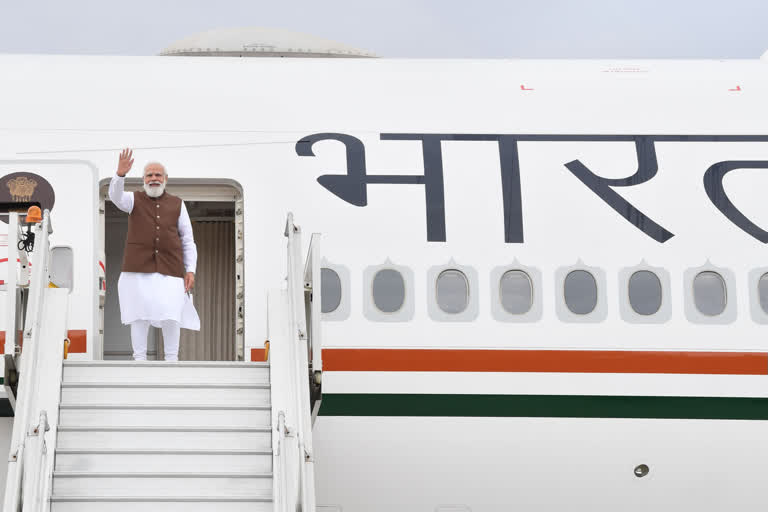Hyderabad: The 76th UN General Assembly session that got underway Tuesday is likely to focus on three major issues – climate change, the Covid pandemic and the developments in Afghanistan. India has its stakes in all the three issues.
There are many firsts with this session of UNGA. It is the first UNGA meet of Joe Biden as US President, it’s the first UNGA meet of its new President Abdulla Shahid, and it is the first physical meet since the pandemic swept the world. This is the first formal meeting of UNGA after the Taliban takeover in Afghanistan. Also, unlike last year's UNGA session, this time it is being held in person and more than 100 world leaders including Indian Prime Minister Narendra Modi are going to be present or address the meet physically. Another important fact is that this session is coinciding with the Quad meet to be held at the White House with the leaders of four world powers- India, Japan, Australia, and United States. Since the Quad is emerging as a major power bloc of the 21st century, its effect on UNGA will be inevitable.
The Covid pandemic is expected to get top priority at this UNGA session. Ever since the Wuhan virus created havoc across the globe, countries are still struggling to find relief. Economies have been destroyed and scores of lives lost.
Also read: Biden declares world at 'inflection point' amid crises
The biggest challenge is visible in developing or underdeveloped countries where there are no adequate healthcare facilities. Some of these countries like Afghanistan, Syria, Iraq, and some states in Africa are active war zones. Provision of healthcare and vaccination in these countries is a bigger challenge for UNGA. Although GAVI and other organisations are doing their bit in accordance with World Health Organisation guidelines, yet UNGA must add value to their efforts by bringing the world together. Developed countries must contribute more so that poorer countries can be benefited. There is a need to rebuild, regenerate and prevent further damage and UNGA must play its role.
India has suffered a lot due to the Covid pandemic and fought the battle alone with little support from world powers. So, it needs an active participation of UNGA in providing a helping hand to developing economies.
Afghanistan, after the Taliban takeover in August, is going through its worst humanitarian crisis with lack of funds, poor healthcare facilities and violation of women’s rights. The current power centre of Afghanistan, which has more than half of its members as designated terrorists, is deeply involved in suppression of minorities, gross violation of human rights, drug trade and international terrorism. The Taliban is desperate for legitimacy and countries like Pakistan and China are supporting it. Certainly, there will be voices in the assembly hall to grant legitimacy to the Taliban, but UNGA must think of its repercussions too. During the current session, UNGA must look at how it can exercise its powers in Afghanistan. Since the bigger threat is terrorism and in the light of UN Security Council resolution 2593 adopted August 26, this issue becomes all the more important.
India has been the victim of Islamic terrorism for over three decades and with ultra-fanatic Taliban controlling power corridors in Afghanistan, it must express its concerns to the UNGA in no uncertain words. The role of Pakistan in promoting global terrorism is not a secret for anyone, so when Prime Minister Modi is expected to address the event September 25, these issues will be raised. Being the biggest economy of this region, India needs to maintain peace and stability across the subcontinent. Taliban’s relations with global terror groups are not a secret anymore and their rule in Afghanistan will invariably threaten the entire world.
Also read: Racism, climate and divisions top UN agenda as leaders meet
Climate change has been a hot topic in previous UNGA sessions. The UN Framework Convention on Climate Change (UNFCCC) has been struggling hard to bring down the emission of greenhouse gases and reduce carbon footprints. Currently, the US has the highest per capita CO2 emissions in the world and other developed countries are following it closely. Ever since its inception, UNFCCC is struggling to make developed countries understand the need of the day. From the 1997 Kyoto Protocol, 2009 Copenhagen accord, 2015 Paris Agreement and the 2016 Kigali amendment to the Montreal protocol, all of them have emphasised the need for a change. There are biased opinions about the role of developed and developing countries in fighting climate change, so It is highly unlikely that a consensus will be obtained. However, the issue is very pertinent to the ongoing UN General Assembly session.
There is an expectation that India as a leading voice for developing world as well as the member of UN Security Council will use its voice to take up global issues such as climate change, Sustainable Development Goals, poverty eradication, economic recovery, women's empowerment and their participation in government structures, and UNSC reforms among others. Modi has always addressed some of the core issues confronting the world, and those of importance and concern to India, including some of the country's achievements on the domestic front.
India expects the coming year at the UNGA to be free of tensions. Maldivian Foreign Minister Abdulla Shahid has been elected as the 76th President of the UNGA. His election is significant. He is the first Maldivian and only the sixth person from the 52-member Small Island Developing States (SIDS) to hold the prestigious post.



